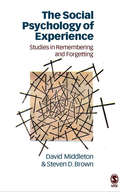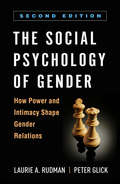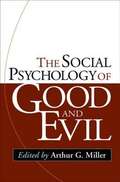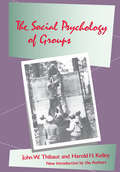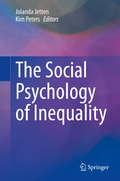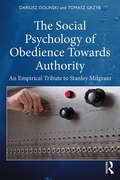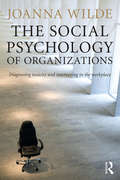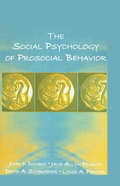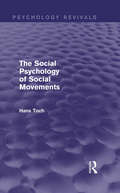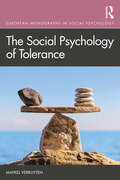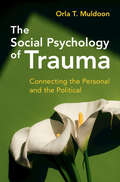- Table View
- List View
The Social Psychology of Everyday Politics
by Caroline Howarth Eleni AndreouliThe Social Psychology of Everyday Politics examines the ways in which politics permeates everyday life, from the ordinary interactions we have with others to the sense of belonging and identity developed within social groups and communities. Discrimination, prejudice, inclusion and social change, politics is an on-going process that is not solely the domain of the elected and the powerful. Using a social and political psychological lens to examine how politics is enacted in contemporary societies, the book takes an explicitly critical approach that places political activity within collective processes rather than individual behaviors. While the studies covered in the book do not ignore the importance of the individual, they underscore the need to examine the role of culture, history, ideology and social context as integral to psychological processes. Individuals act, but they do not act in isolation from the groups and societies in which they belong. Drawing on extensive international research, with contributions from leaders in the field as well as emerging scholars, the book is divided into three interrelated parts which cover: The politics of intercultural relations Political agency and social change Political discourse and practice Offering insights into how psychology can be applied to some of the most pressing social issues we face, this will be fascinating reading for students of psychology, political science, sociology and cultural studies, as well as anyone working in the area of public policy.
The Social Psychology of Experience: Studies in Remembering and Forgetting (Inquiries in Social Construction series)
by Steven Brown David Middleton`A smart, thoughtful, and well-written book that takes social memory studies in a bold new direction and will attract an audience from across the social sciences for years to come' - Theory & Psychology What informs the process of remembering and forgetting? Is it merely about our capability to store and retrieve experiences in a purely functional sense? What about 'collective memories', not just those of the individual - how do these manifest themselves in the passages of time? The authors present a new, fascinating insight into the social psychology of experience drawing upon a number of classic works (particularly by Frederick Bartlett, Maurice Halbwachs & Henri Bergson) to help develop their argument. The significance of their ideas for developing a contemporary psychology of experience is illustrated with material from studies focused on settings at home and at work, in public and commercial organizations where remembering and forgetting are matters of concern, involving language and text based communication, objects and place. As their argument unfolds, the authors reveal that memories do not solely reside in a linear passage of time, linking past, present and future, nor do they solely rest within the indidvidual's conciousness, but that memory sits at the very heart of 'lived experience'; whether collective or individual, the vehicle for how we remember or forget is linked to social interaction, object interaction and the different durations of living that we all have. It is very much connected to the social psychology of experience. This book is written for advanced undergraduate, masters and doctoral students in social psychology. However, it will also be of particular value on courses that deal with conceptual and historical issues in psychology (in cognate disciplines as well) and supplmentary reading in cognitive science.
The Social Psychology of Gender, Second Edition: How Power and Intimacy Shape Gender Relations (Texts In Social Psychology Ser.)
by Peter Glick Laurie A. RudmanNoted for its accessibility, this text--now revised and updated to reflect a decade of advances in the field--examines how attitudes and beliefs about gender profoundly shape all aspects of daily life. From the schoolyard to the workplace to dating, sex, and marriage, men and women alike are pressured to conform to gender roles that limit their choices and impede equality. The text uses real-world examples to explore such compelling questions as where masculine and feminine stereotypes come from, the often hidden ways in which male dominance is maintained, and how challenging conventional romantic ideals can strengthen heterosexual relationships. New to This Edition *Chapter on the sexualization of women's bodies, and resistance to it (including #MeToo). *Chapter on the harmful effects of "real man" ideology. *Numerous new examples drawn from current events. *Updated throughout with the latest theories, research, and findings.
The Social Psychology of Good and Evil
by Arthur G. MillerThis compelling work brings together an array of distinguished scholars to explore key concepts, theories, and findings pertaining to some of the most fundamental issues in social life: the conditions under which people are kind and helpful to others or, conversely, under which they commit harmful, even murderous acts. Covered are such topics as the complex interaction of individual, societal, and situational factors underpinning good or evil behavior; the role of guilt and the self-concept; and issues of responsibility and motivation, including why good people do bad things. The volume also examines whether aggression and violence are inescapable aspects of human nature, and how cooperative interaction can break down stereotyping and discrimination.
The Social Psychology of Good and Evil, Second Edition
by Arthur G. MillerThis timely, accessible reference and text addresses some of the most fundamental questions about human behavior, such as what causes racism and prejudice and why good people do bad things. Leading authorities present state-of-the-science theoretical and empirical work. Essential themes include the complex interaction of individual, societal, and situational factors underpinning good or evil behavior; the role of moral emotions, unconscious bias, and the self-concept; issues of responsibility and motivation; and how technology and globalization have enabled newer forms of threat and harm. New to This Edition *Many new authors; extensively revised with the latest theory and research. *Section on group perspectives, with chapters on bystanders to emergencies, remembering historical victimization, organizational dynamics, and globalization and terrorism. *Chapters on free will, conscious versus unconscious processes, media violence, dehumanization, genocide, and sexual violence. *Chapters on false moral superiority, compassionate goals in relationships, and moral emotions in incarcerated offenders.
The Social Psychology of Groups
by John W. ThibautThis landmark theory of interpersonal relations and group functioning argues that the starting point for understanding social behavior is the analysis of dyadic interdependence. Such an analysis portrays the ways in which the separate and joint actions of two persons affect the quality of their lives and the survival of their relationship. The authors focus on patterns of interdependence, and on the assumption that these patterns play an important causal role in the processes, roles, and norms of relationships. This powerful theory has many applications in all the social sciences, including the study of social and moral norms; close-pair relationships; conflicts of interest and cognitive disputes; social orientations; the social evolution of economic prosperity and leadership in groups; and personal relationships.
The Social Psychology of HIV Infection (Psychology Library Editions: Social Psychology)
by John Pryor Glenn ReederIn the early 1980s we witnessed the birth of one of the most complex and perplexing social problems faced by modern society: the epidemic of infection with human immunodeficiency virus (HIV), which causes acquired immunodeficiency syndrome (AIDS). Originally published in 1993 this title looks at the social psychology surrounding HIV and AIDS. The organization of the volume centres upon two themes: The Theoretical Roots of Prevention and The Dilemma of the PWA (person with AIDS). The goal of this volume is not to evaluate previous attempts to answer these social problems, but to provide theoretical analyses of some of the basic sociopsychological processes that underlie the problems. Over 20 years on this is a snapshot of research into HIV and AIDS and attitudes of the time looking at social problems that are very much still with us.
The Social Psychology of Humor
by Madelijn StrickThis important new book provides a comprehensive analysis of humor from a social-psychological perspective, addressing questions about the use of humor and its effects in daily life. It examines the social psychology of humor on micro-level phenomena, such as attitudes, persuasion, and social perception, as well as exploring its use and effect on macro-level phenomena such as conformity, group processes, cohesion, and intergroup relations. Humor is inherently a social experience, shared among people, essential to nearly every type of interpersonal relationship. In this accessible volume, Strick and Ford review current research and new theoretical advancements to identify pressing open questions and propose new directions for future research in the social psychology of humor. The book explores fascinating topics such as humor in advertising, political satire, and the importance of a sense of humor in maintaining romantic relationships. It also examines how racist or sexist humor can affect personal and intergroup relations, and discusses how to confront inappropriate jokes. Offering new, precise, and operational conceptions of humor in social processes, this book will be essential reading for students and academics in social psychology, media, and communication studies.
The Social Psychology of Inequality
by Jolanda Jetten Kim PetersEconomic inequality has been of considerable interest to academics, citizens, and politicians worldwide for the past decade–and while economic inequality has attracted a considerable amount of research attention, it is only more recently that researchers have considered that economic inequality may have broader societal implications. However, while there is an increasingly clear picture of the varied ways in which economic inequality harms the fabric of society, there is a relatively poor understanding of the social psychological processes that are at work in unequal societies. This edited book aims to build on this emerging area of research by bringing together researchers who are at the forefront of this development and who can therefore provide timely insight to academics and practitioners who are grappling with the impact of economic inequality. This book will address questions relating to perceptions of inequality, mechanisms underlying effects of inequality, various consequences of inequality and the factors that contribute to the maintenance of inequality. The target audiences are students at advanced undergraduate or graduate level, as well as scholars and professionals in the field. The book fills a niche of both applied and practical relevance, strongly emphasizing theory and integration of different perspectives in social psychology. Given the broad interest in inequality within the social sciences, the book will be accessible to sociologists and political scientists as well as social, organizational, and developmental psychologists. The insights brought together in The Social Psychology of Inequality will contribute to a broader understanding of the far-reaching costs of inequality for the social health of a society and its citizens."This edited volume brings together cutting-edge social psychological research addressing one of the most pressing issues of our times – economic inequality. Collectively, the chapters illuminate why inequality has negative effects on individuals and societies, when and for whom these negative effects are most likely to emerge, and the psychological mechanisms that maintain inequality. This comprehensive volume is an essential read for those interested in understanding and ameliorating inequality." -Brenda Major, Distinguished Professor, Department of Psychological and Brain Sciences, University of California “This invaluable volume demonstrates the indispensable and powerful contribution that social psychologists can make to our understanding of societal inequality. For those outside of social psychology it provides a unique and comprehensive overview of what social psychology has to offer, and for social psychologists it is exemplary in demonstrating how to make a systematic contribution to the understanding of a hotly debated real-world issue. Scholars and students alike and from various disciplines will gain much from reading this fascinating and inspiring social psychological journey.”-Maykel Verkuyten, Professor in Interdisciplinary Social Science, University of Utrecht“The Social Psychology of Inequality offers a superb and timely social-psychological analysis of the causes and consequence of increasing wealth and income gaps. With its refreshingly international authorship, this volume offers profound insights into the cognitive and social mechanisms that help maintain, but potentially also to overcome, an economy that is rigged in favor of the wealthy. A new and stimulating voice, illustrating science in the service of a fairer and more democratic society.” -Anne Maass, Professor of Social Psychology, University of Padova“This volume assembles an impressive list of leading international scholars to address a timely and important issue, the causes and consequences of economic inequality. The approach to the topic is social psychol
The Social Psychology of Living Well (Sydney Symposium of Social Psychology)
by Roy F. Baumeister Joseph P. ForgasHow to live well and the search for meaning have long been of intense concern to humans, perhaps because Homo sapiens is the only species aware of its own mortality. In the last few decades, empirical psychology made a major contribution to this quest. This book surveys groundbreaking work by leading international researchers, demonstrating that social psychology is the core discipline for understanding well-being and the search for meaning. Basic conceptual and theoretical principles are discussed, drawing on philosophy, evolutionary theory and psychology, followed by a review of the role of purposeful, motivated activity and self-control in achieving life satisfaction. The role of emotional and cognitive processes and the influence of social, interpersonal and cultural factors in promoting a happy and meaningful life are discussed. The book will be of interest to students, practitioners and researchers in the behavioral and social sciences, as well as to laypersons for whom improving the quality of human life and understanding the principles of well-being are of interest.
The Social Psychology of Morality (Sydney Symposium of Social Psychology)
by Joseph P. Forgas Lee Jussim Paul A.M. Van LangeEver since Plato’s ‘Republic’ was written over two thousand years ago, one of the main concerns of social philosophy and later empirical social science was to understand the moral nature of human beings. The faculty to think and act in terms of overarching moral values is as much a defining hallmark of our species as is our intelligence, so homo moralis is no less an appropriate term to describe humans as homo sapiens. This volume makes a case for the pivotal role of social psychology as the core discipline for studying morality. The book is divided into four parts. First, the role of social psychological processes in moral values and judgments is discussed, followed by an analysis of the role of morality in interpersonal processes. The sometimes paradoxical, ironic effects of moral beliefs are described next, and in the final section the role of morality in collective and group behavior is considered. This book will be of interest to students and researchers in the social and behavioral sciences concerned with moral behavior, as well as professionals and practitioners in clinical, counseling, organizational, marketing and educational psychology where issues of ethics and morality are of importance.
The Social Psychology of Nonverbal Communication
by Derek Chadee Aleksandra KostićThe Social Psychology of Nonverbal Communication gathers together leading nonverbal communication scholars from around the world to offer insight into a range of issues within the nonverbal literature with the aim to rethink current approaches to the subject.
The Social Psychology of Obedience Towards Authority: An Empirical Tribute to Stanley Milgram
by Dariusz Dolinski Tomasz GrzybThis rich volume explores the complex problem of obedience and conformity, re-examining Stanley Milgram’s famous electric shock study, and presenting the findings of the most extensive empirical study on obedience toward authority since Milgram's era. Dolinski and Grzyb refer to their own series of studies testing various hypotheses from Milgram’s and others’ research, examining underlying obedience mechanisms as well as factors modifying the degree of obedience displayed by individuals in different situations. They offer their theoretical model explaining subjects’ obedience in Milgram’s paradigm and describe numerous examples of the destructive effect of thoughtless obedience both in our daily lives as well as in crucial historical events, stressing the need for critical thinking when issued with a command. Concluding with reflections on how to prevent the danger of destructive obedience to authority, this insightful volume will be fascinating reading for students and academics in social psychology, as well as those in fields concerned with complex social problems.
The Social Psychology of Organizations: Diagnosing Toxicity and Intervening in the Workplace
by Joanna WildeHealthy and successful organizations require the people who work within them to be happy, resilient and creative. Just as a human body is undermined if it suffers from sickness, so an organization can only function fully if the people who work within it feel engagement and well-being, and any toxic influences which shape or burden their working lives are resolved This important new title provides a much-needed overview not only of what it means for an organization to be weakened by pervasive psychological influences within the working environment, but also how this dysfunction can be addressed through psychological interventions. The book is split into three core sections: Toxicity and Dysfunction in the workplace, outlining structural, behavioural, emotional and cognitive sources of toxicity that undermine organizations Principles of the healthy workplace, outlining core concepts of belonging, contribution and meaning from which organizations in turn benefit Creating the healthy workplace, outlining a range of approaches to addressing organizational toxicity, including design thinking, positive psychology, and evidence-based approaches. Written by a practicing organizational psychologist, and including case studies to illustrate how toxicity at the micro level can impact upon wider organizational goals, the book draws on a wide range of literature to provide an accessible, focussed understanding of how the individual psychological experiences of working people can have wider consequences for an organization, and how interventions within that process can address these issues. It is ideal reading for students and researchers of occupational or organizational psychology, organizational behaviour, business and management and HRM.
The Social Psychology of Perceiving Others Accurately
by Hall, Judith A. and Mast, Marianne Schmid and West, Tessa V. Judith A. Hall Marianne Schmid Mast Tessa V. WestWe are constantly forming impressions about those around us. Social interaction depends on our understanding of interpersonal behavior - assessing one another's personality, emotions, thoughts and feelings, attitudes, deceptiveness, group memberships, and other personal characteristics through facial expressions, body language, voice and spoken language. But how accurate are our impressions and when does such accuracy matter? How is accuracy achieved and are some of us more successful at achieving it than others? This comprehensive overview presents cutting-edge research on this fast-expanding field and will be essential reading for anyone interested in the psychology of interpersonal perception. A wide range of experts in the field explore topics including age and gender effects, psychopathology, culture and ethnicity, workplaces and leadership, clinicians' skills, empathy, meta-perception, and training people to be more accurate in their perceptions of others.
The Social Psychology of Prosocial Behavior
by Louis A. Penner John F. Dovidio Jane Allyn Piliavin David A. SchroederWritten by four leading researchers in the study of prosocial behavior, this book introduces a new perspective on prosocial behavior for the 21st century. Building on the bystander intervention work that has defined this area since the 1960s, The Social Psychology of Prosocial Behavior examines prosocial behavior from a multilevel perspective that explores the diverse influences that promote actions for the benefit of others and the myriad ways that prosocial actions can be manifested. The authors expand the breadth of the field, incorporating analyses of biological and genetic factors that predispose individuals to be concerned for the well being of others, as well as planned helping such as volunteering and organizational citizenship behavior and cooperative behavior within and between groups. They identify both the common and the unique processes that underlie the broad spectrum of prosocial behavior.Each chapter begins with a question about prosocial behavior and ends with a summary that answers the question. The final chapter summarizes the questions and the answers that research provides. Conceptual models that elaborate on and extend the multilevel approach to prosocial behavior are used to tie these findings together. The book concludes with suggestions for future research. The Social Psychology of Prosocial Behavior addresses the following:*the evolution of altruistic tendencies and other biological explanations of why humans are predisposed to be prosocial;*how the situation and motives that are elicited by these situations affect when and how people help;*the causes and maintenance of long-term helping, such as volunteering;*how prosocial behavior changes over time and the developmental processes responsible for these changes;*the consequences of helping for both the people who provide it and those who receive it;*helping and cooperation within and between groups and the implications of these actions.This accessible text is ideal for advanced courses on helping and altruism or prosocial behavior, taught in psychology, sociology, management, political science, and communication, or for anyone interested in learning more about prosocial behavior in general.
The Social Psychology of Religion (Psychology Revivals #Volume 11)
by Michael Argyle Benjamin Beit-HallahmiOriginally published in 1975, this book is a completely rewritten, revised version of Michael Argyle’s standard work, Religious Behaviour, first published in 1958. A great deal of new research had appeared since that date, which threw new light on the nature and origins of religious behaviour, beliefs and experience. Trends in religious activity in Britain and the United States since 1900, and the state of religion in these two countries at the time, are examined. Evidence is presented on the origins of religious activity – including the effects of stress, drugs, meditation, evangelistic meetings, personality variables, and social class. Other studies examine the effects of religion, for example on mental and physical health, political attitudes, racial prejudice, sexual behaviour, morals, and the relation between religion and scientific and other achievements. The findings are used to test the main theories about religion which have been put forward by psychologists and other social scientists, such as Freud’s father-projection theory, cognitive need theories, and deprivation-compensation theories.
The Social Psychology of Social Movements (Psychology Revivals)
by Hans TochThe social movements that Professor Toch examines in this book, originally published in 1966, range from the Black Muslims to food faddists, and the founders of these movements range from Hitler to Joan of Arc. Why do people join social movements? How do such movements serve the needs of their members, and what unique social problems do they cause? What are the typical consequences of membership? What gives rise to social movements, and how can we evaluate them? In The Social Psychology of Social Movements Hans Toch provides answers to these questions. It is impossible to avoid in a study of this sort the universal human implications of social movements, the latent tragedy and despair which involvement in such collective action implies. The humour, adversity and pathos is equally evident in many of the examples which Professor Toch describes. But he provides a sympathetic objectivity, and is at pains to provide a systematic psychological survey of large, ideologically orientated groups and their members in general.
The Social Psychology of Tolerance (European Monographs in Social Psychology)
by Maykel VerkuytenThis highly topical book is the first of its kind to provide a comprehensive theoretical and empirical discussion of the social psychology of tolerance, exploring the importance and drawbacks of a focus on tolerance and discussing how tolerance can be stimulated in a range of contexts. The importance of tolerance for a diverse, equal, and open society is increasingly recognized by social and behavioural scientists. When people are aware of salient differences and disagree about the value of various viewpoints and ways of life, the question of tolerance arises. Not only in relation to religious, cultural, ideological, and viewpoint differences but also concerning everyday things such as annoying habits of one’s partner, the views and behaviour of one’s children, disagreements at work, and neighbourhood hassles. Verkuyten uses concrete examples to discuss the various reasons for why tolerance is vital for peaceful communities, especially in our increasingly diverse and polarized world. Providing a thorough examination of the social psychology of tolerance, this is a valuable text not only to social psychologists but to a range of students and scholars in the social and behavioural sciences more broadly.
The Social Psychology of Trauma: Connecting the Personal and the Political
by Orla T. MuldoonMany of us have been affected by trauma and struggle to manage our health and well-being. The social psychological approach to health highlights how social and cultural forces, as much as individual ones, are central to how we experience and cope with adversity. This book integrates psychology, politics, and medicine to offer a new understanding that speaks to the causes and consequences of traumatic experiences. Connecting the personal with the political, Muldoon details the evidence that traumatic experiences can, under certain conditions, impact people's political positions and appetite for social change. This perspective reveals trauma as a socially situated phenomenon linked to power and privilege or disempowerment and disadvantage. The discussion will interest those affected by trauma and those supporting them, as well as students, researchers, practitioners, and policy makers in social psychology, health and clinical psychology, and political science. This title is available as open access on Cambridge Core.
The Social Psychology of the Child with Epilepsy (Psychology Library Editions: Social Psychology)
by Christopher BagleyWhen this title was first published in 1971, there were about 300, 000 people with epilepsy in England and Wales. Nearly one-third of them were children. This book is an integrated review of how epileptic children behaved, and of how they were regarded by parents, teachers and peers at the time. Written by a sociologist with a training in psychology, human biology and education, the book draws on several disciplines – sociology, psychology, biology – in seeking to understand the complex determinants of deviant behaviour in children with epilepsy. The author considers in detail the lives of 118 epileptic children, bringing together and analysing a wide range of measurements of behaviour, social relations and abnormalities of brain function. He discusses how the children fare in school, and how epilepsy affects both the teacher’s perception of the child and the child’s scholastic performance. The dearth of medical centres which could diagnose and treat epilepsy at the time is examined, and hospital use according to parents’ social class is analysed. The author looks at the role of parents of epileptic children and shows that their attitude to epilepsy is of major importance for the child’s adjustment. The prejudice to which epileptic children and adolescents were subjected by the world at large is chronicled in detail. Finally the author considers how his empirical material makes a contribution to the theoretical problem of integrating sociology, psychology and biology into a single discipline concerned with the explanation of human social behaviour.
The Social Psychology of the Classroom (Routledge Research In Education Ser.)
by Elisha BabadTeachers often find that their training has not provided them with sufficient knowledge and understanding about underlying social forces and processes in their classrooms. This new book addresses this gap by focusing on the social psychology of the classroom, providing the relevant social psychological knowledge and facilitating the application of
The Social Purposes of Education: Personal and Social Values in Education (International Library of Sociology #13)
by K.G. CollierFirst Published in 1998. Routledge is an imprint of Taylor & Francis, an informa company.
The Social Role of the Man of Knowledge
by Florian ZnanieckiIn this seminal contribution to the sociology of knowledge, first published in 1940, Florian Znaniecki develops a typology of the variety of specific social roles that scholars have played, and investigates the normative patterns that govern their behavior. A central tool for the investigation of these problems is the notion of “social circle”, the audience to which intellectuals address themselves. Znaniecki shows that thinkers do not speak to the total society but address selected segments and markets. Specific social circles bestow recognition, provide material or psychic support, and help shape the self-image of the thinker.
The Social Roots of Discrimination: The Case of the Jews
by John W. ThibautThe Social Roots of Discrimination explains the phenomenon of anti-Semitism. In this classic volume, Peretz F. Bernstein looks for objective reasons why anti-Semitism flourished in European countries. Some civilized people would consider the notion of race uncivilized, but the existence of different races and the inequality of races with their specific race characteristics and on top of that the existence of superior and inferior human races was accepted as a fact of life and as a scientific truth long before the Nazis came to power. Although there is a marked difference in dealing with anti-Semitism in continental Europe in 1920 and the anti-Semitism in, for instance, the US in 2000, Berstein's ideas remain valuable.Starting from a concrete problem, anti-Semitism in Central Europe, Bernstein puts anti-Semitism in a general sociological theoretical framework. Far from limiting himself to fruitless elaborations on the common perceived unpleasant characteristics of Jews, he recognizes that the group is heterogeneous and that the usual arguments to justify anti-Semitism do not have any general validity, although they may hold for some specific individuals of the hated group, like individual members of any group may be less pleasant. Bernstein's ideas remain valuable.Bernstein tries to explain the hatred of Jews as the working of a more general mechanism--one that has nothing to do specifically with of Jews as a collective or as individuals. In doing so Bernstein attempts to sketch a general theory of social groups and conflicts between groups. The Social Roots of Discrimination gives an important message both for social scientists and for all intellectuals who are concerned with the strifes between nations, races, and social groups.

